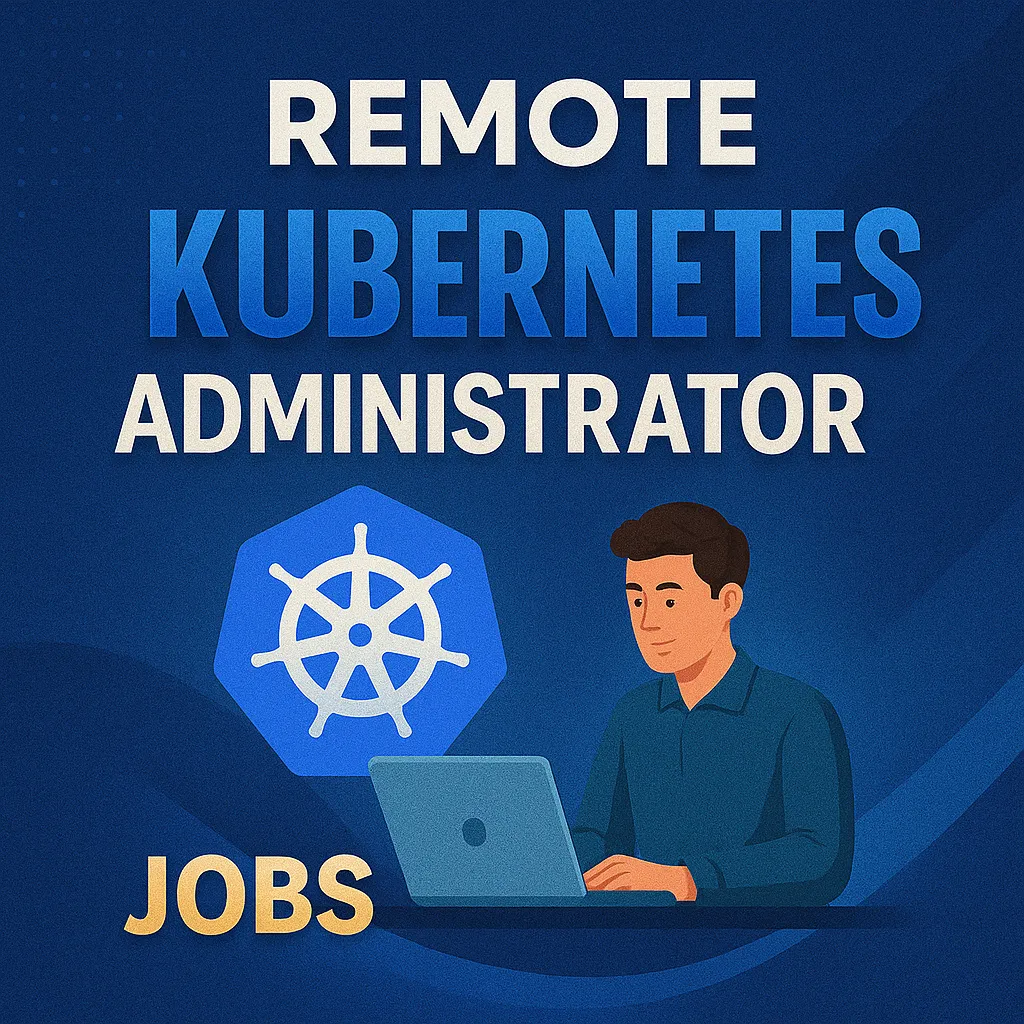Remote Kubernetes Administrator
Description
Remote Kubernetes Administrator
Shape the Future of Cloud Infrastructure—Remotely
Are you ready to play a crucial role in shaping the way organizations build, scale, and secure their digital ecosystems? As a Remote Kubernetes Administrator, your impact will be felt by teams worldwide, enabling them to launch, manage, and maintain robust applications with ease. In this role, your mastery of Kubernetes will power highly available systems, efficient workflows, and innovation in every release—while you enjoy the flexibility and focus that remote work offers.
Introduction to the Role
The modern workplace is rapidly evolving, with remote teams and cloud-native applications at its core. This position is ideal for individuals who have a knack for managing distributed systems and genuinely care about maintaining stable and efficient clusters. You’ll have ownership over the deployment and management of critical services, driving operational excellence for companies that depend on flawless digital experiences.
Your expertise in container orchestration, automation, and monitoring will support complex projects across multiple environments, from development to production. You’ll join a team of forward-thinking engineers who believe in collaboration, knowledge-sharing, and leveraging technology to make a tangible difference. If you enjoy solving puzzles at scale, embracing new challenges, and sharing what you learn, this is your opportunity to contribute meaningfully in a high-impact, high-autonomy environment.
What You’ll Do Every Day
- Deploy, configure, and manage Kubernetes clusters to ensure reliability, scalability, and firm performance for all workloads.
- Automate key workflows using Helm, Terraform, and CI/CD platforms to streamline releases and updates
- Work closely with developers, DevOps engineers, and security teams to integrate Kubernetes with existing infrastructure, service mesh tools, and monitoring platforms.
- Troubleshoot and resolve incidents quickly, using logging and observability tools to identify root causes and prevent recurrence
- Design and enforce security best practices across clusters, including access controls, secrets management, and network policies
- Develop and oversee reliable backup routines and recovery processes to ensure that critical information is always secure and retrievable in the event of an unexpected incident.
- Optimize cloud resource usage, reducing costs while maintaining the integrity of business-critical applications.
- Document cluster architecture, processes, and troubleshooting guides to help the team learn, onboard, and respond efficiently to changes
- Participate in architecture discussions, providing expertise to guide future cloud-native projects and improve platform reliability.
Essential Skills for Success
- Solid experience administering Kubernetes clusters in production, with both managed (EKS, GKE, AKS) and self-hosted solutions
- Mastery of Docker and containerization, understanding image optimization and secure deployment techniques
- Strong familiarity with Helm charts, YAML manifests, and automating deployments using tools like Terraform or Ansible.
- Knowledge of CI/CD pipelines (Jenkins, GitLab CI, GitHub Actions) and integrating automated testing, building, and deployment into Kubernetes workflows
- Competence in public cloud platforms such as AWS, Azure, or Google Cloud Platform, including resource provisioning and security management
- Hands-on experience with observability tools like Prometheus, Grafana, and the ELK Stack for monitoring and incident response
- Scripting and automation proficiency using Bash, Python, or Go, enabling custom integrations and rapid problem-solving
- Deep understanding of networking fundamentals, ingress controllers, DNS, and service discovery within cloud-native architectures
- Strong troubleshooting skills, capable of responding effectively to critical incidents and minimizing downtime
The Type of Person Who Thrives
- You have a passion for cloud infrastructure and view Kubernetes as more than just a tool but a foundation for scalable and reliable systems.
- You approach new problems with curiosity and methodical thinking, always seeking opportunities to automate, document, and improve.
- You communicate clearly—both in writing and in conversations—making it easy for team members to understand your thought process and decisions.
- You’re comfortable working independently and asynchronously, prioritizing your workload, and delivering results without constant supervision.
- You thrive in globally distributed teams, value transparency, and recognize knowledge sharing as a crucial component of team success.
Tools and Technologies You’ll Use
- Kubernetes (EKS, GKE, AKS, or self-hosted)
- Docker
- Helm
- Terraform and/or Ansible
- Git, GitHub, GitLab
- Jenkins, GitHub Actions, GitLab CI
- Prometheus, Grafana, ELK Stack
- Cloud services (AWS EC2, S3, IAM, VPC; Azure equivalents)
- Service mesh solutions (Istio, Linkerd)
- Scripting languages (Bash, Python, Go)
What Success Looks Like Here
- Your Kubernetes clusters consistently deliver high availability and rapid scaling, supporting a wide range of applications and user demands.
- You spot issues before they become serious and act quickly, using innovative monitoring tools and a straightforward process to resolve them promptly.
- Teams can ship features and updates with confidence, benefiting from reliable deployment pipelines and precise documentation.
- Costs are managed without compromising reliability as you identify and implement resource efficiencies.
- Security and compliance standards are maintained, with every cluster adhering to best practices and internal policies.
- Collaboration flourishes, with you sharing knowledge and supporting team members in tackling technical challenges.
Our Approach to Remote Work
- Work from anywhere—set your schedule and work where you’re most productive, whether that’s at home or in a coworking space.
- Communication is async-first, utilizing Slack, project management tools, and regular updates to keep everyone connected.
- The culture encourages experimentation, learning, and open dialogue, valuing contributions from every team member.
- Regular feedback sessions and knowledge-sharing initiatives help you build your skills and contribute significantly to the team's success in achieving its goals.
- Achievements, new ideas, and dedication to quality are celebrated and recognized.
Professional Background: We’re Seeking
- At least 3 years of experience managing Kubernetes clusters in production environments
- Proven track record of automating infrastructure with tools like Terraform or Ansible
- Strong background in container technology, cloud platforms, and microservices architecture
- Proficient with scripting/programming languages commonly used in DevOps settings
- Proven skill in working closely with both technical and non-technical colleagues, especially in a remote environment
- Exceptional analytical, troubleshooting, and communication skills
- Self-starter attitude with the discipline to manage your projects and timelines
Growth, Benefits, and Opportunities
- The competitive annual salary of $87,927 reflects your experience and expertise.
- Health, wellness, and learning stipends to invest in your personal and professional growth
- Pathways for advancement—develop your leadership, specialize further in cloud engineering, or mentor new team members
- Balance work and life on your terms with policies designed to support flexibility and prevent burnout
- Work alongside a diverse team, sharing insights and growing together in a supportive, feedback-rich environment.
Ready to Build, Scale, and Secure the Cloud—From Anywhere?
If you’re passionate about creating, optimizing, and maintaining next-generation cloud infrastructure and want to make an impact from wherever you are, we want to hear from you. Join us and shape how world-class teams deploy scale, and protect their digital platforms, all while advancing your career in a truly modern engineering environment.
Frequently asked questions (FAQs)
1. What does a day actually look like as a Remote Kubernetes Administrator?
Most days kick off with a quick peek at cluster dashboards and alerts—sometimes it’s all green, sometimes there’s a little fire to put out. Before lunch, you might be rolling out a Helm chart update or chasing a weird networking issue. You’ll bounce between tuning resource limits, writing scripts, and helping a dev figure out why their pod keeps crashing. It’s part puzzle, part routine. Some days fly by, others feel like you’re wrestling YAML all afternoon. Nobody’s standing over your shoulder, but your work is what keeps things running for the whole team.
2. What’s genuinely tough about this job?
Kubernetes is constantly evolving, so the learning curve never truly flattens out. There are moments when an upgrade or a mysterious error can consume half your day. If something breaks at 2 a.m. UTC, you may be the one who receives the ping. You’ll also find that not everyone on the team speaks “Kubernetes,” so you’ll spend time explaining things in plain English. But if you like the feeling when a cluster hums along perfectly—yeah, that’s the payoff.
4. What’s the team really like?
Pretty chill, honestly. It’s global, so you get all sorts of people and tech backgrounds, but nobody’s here to play politics. There are regular check-ins, but nobody loves meetings for the sake of meetings. Folks swap memes in Slack, share fixes, and don’t make you feel dumb for asking “rookie” questions. Wins are called out, new ideas are heard, and when things get wild, everyone rallies until it’s sorted.
5. What tech do you end up touching the most?
You’ll spend most of your time working inside Kubernetes and Docker. Helm and Terraform are always up—usually side by side with your code editor. Prometheus and Grafana keep you honest about what’s working and what’s not. For CI/CD, it’s a mix of Jenkins, GitHub Actions, and sometimes GitLab CI. Cloud consoles are open tabs (AWS, GCP, or Azure, depending on the day). And don’t be surprised if you write more Bash and Python than you expected.



